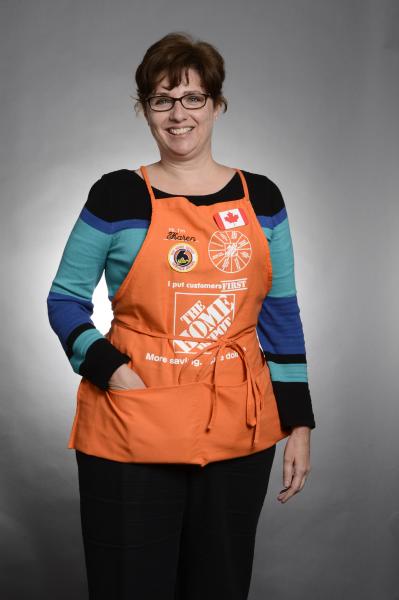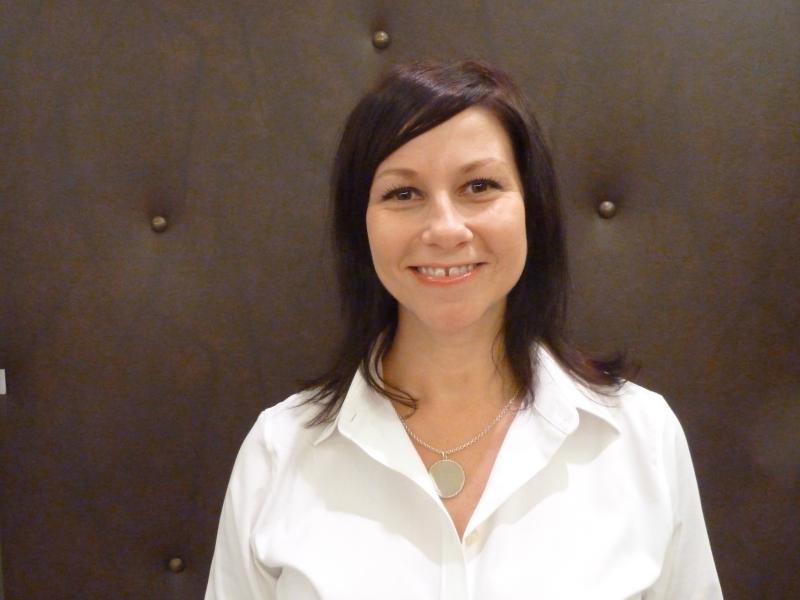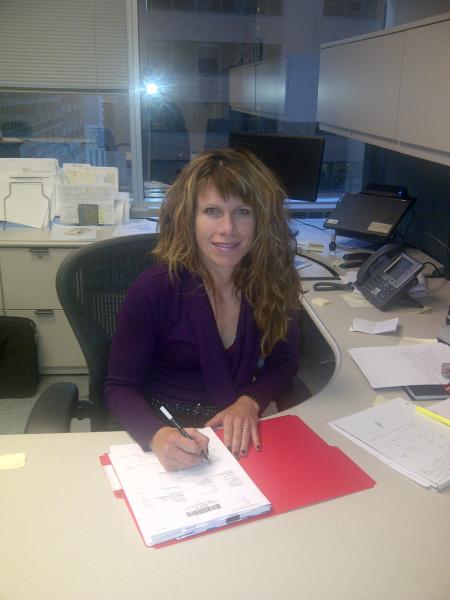
Karen Ritchie
Director, HR and Associate Relations
The Home Depot

When Karen Ritchie finished her education, she knew what she wanted to do, and aimed high. “My goal was to be a director of human resources,” she says, “and to continue to progress into positions of increasing responsibility.”
Like many of us, Ritchie learned much of her valuable career skill in the workplace. After completing a bachelor of arts with a specialty in languages, she landed a job as an employee relations assistant with a paper manufacturer and distributor.
“My first job required the person to be bilingual, so I thought that would be a great opportunity to put my language skills into practice in business,” she says. “I didn’t have human resources experience so that’s where I started and went back to college to get a certificate in human resources and I was able to learn the theory while putting it into practice on the job as well.”
Karen says she took a lot away from that first position, she says that showing initiative and getting involved with many projects and teams as possible is important to learn the business.
“Adapting to the culture of the organization is very important as well,” she points out. “I’ve worked in different industries over the course of my career and understanding if it’s a formal culture where everyone wears business suits or more of a casual culture, and then being able to adapt accordingly.”
After years of hard work, Ritchie reached her goal of achieving a director-level position. She strived to have a well-rounded career, being able to experience many things before reaching a top position, and attributes her career growth to having a clear plan for development.
“When I first started my career in human resources, there were 8–10 key areas where I wanted to gain experience. Early on, I changed jobs every 3 years because I was building upon getting experience in those areas, so I would get as much experience as I could with certain organizations. But, at certain points, there was no more growing I could do, so I needed to change jobs in order to continue to grow and develop.”
Now, Ritchie and her team provide timely and knowledgeable human resources support to innumerable associates in all fields, from finance to supply chain to marketing. She’s responsible for the entire associate relations team that provides day-to-day guidance to all HR partners in stores across Canada.
To get to a position of responsibility and importance, Ritchie has some key advice: “For any new grad, it’s really important to build your professional network: joining an association in your field is a great way to volunteer and get to know people. It’s really critical early in your career to find a mentor, someone who can provide advice and coaching.”
She also recommends that new employees be heard. “I think it’s also important to take your place at the table. You’re at the table for a reason, you’ve been hired with the company for a reason, so to be sure to voice your point of view. I find often that some of the folks I work with are a little bit shy and overwhelmed at the beginning so I think it’s important to find your voice and contribute to the conversation.”
Chantel Sawchuk
Regional Director of Operations
Starbucks Coffee Company

Seven years ago, Chantel Sawchuk joinedStarbucks Coffee Company as a district manager. “[Initially] I came over to Starbucks because of a mentor,” she explains. Since then, Sawchuk has not only grown to love working for the world’s leading retailer, roaster and brand of specialty coffee, she has also become a regional director of operations, overseeing stores in Southern Alberta and Saskatchewan.
“While I was taking my university degree, I was working part-time at the Gap,” she says. Partaking in the Gap’s management training program, which involved taking on a managerial role while also studying, Sawchuk was able to “apply real life experiences that I was learning about in university while working on the job.” This eventually led to her relocation to Alberta where she made the leap over to Starbucks.
While she had some previous managerial experience in retail, the transition to district manager was a “significant stepping stone.” Only 21 at the time, she recalls joining a team with several challenges and quickly learning the importance of building meaningful and trusting relationships with co-workers. She also discovered that effective management can be both a learned and inherent skill.
“Some of the key components [of management] are planning and organizing, having a vision, setting goals, having specific objectives, and having strong discipline in following-up and recognizing progress along the way,” she says. Of leadership, Sawchuk says: “It’s really the gauging, inspiring, motivating, and bringing along people with you who want to achieve the same objectives. I also think humility; so being able to say ‘I don’t know what I’m doing’ and that’s okay.”
As a female leader, she has also taken the opportunity to join networking groups for women, including the Women’s Foodservice Forum. “I have expanded my network a hundred times by joining,” she says, adding that it’s a group of highly engaged, motivated, and driven women that “most importantly want each other to succeed.”
Sawchuk also outlines significant differences between women and men and their attitudes towards business. “Often I see females focused on team goals and putting themselves last. Their achievements have nothing to do with them, but everything to do with their team, and the people that have gone above and beyond,” she says. She adds that Starbucks strongly supports work-life balance, putting the families of employees first, and respecting their personal time—something particularly important while striving to be a high-achiever.
Putting her past experience into perspective, Sawchuk has been able to reflect on the importance of her previous positions. “Part of what has enabled me to have such a great experience in my career is due to all kinds of different roles and assuming that every single role, [including] several lateral assignments, teaches you something,” she says. “Every single role that I have taken on has added something to my tool belt that I have inevitably applied later on somewhere, and thought ‘oh yeah, that’s where I learnt that.’”
She also says that while many women struggle with a lack of confidence, if they can believe in themselves it will allow them to make huge achievements. Last, Sawchuk emphasizes that having a mentor—who can come in any shape or form—can be a huge support and a great sounding board in gaining advice and perspective.
“We need women in business and we need them in leadership positions, to continue to push forward,” she says.
Heather Wilcott
Operations Integrity Manager
Imperial Oil

With a master’s degree in chemical engineering and years of experience on a groundbreaking new project, Heather Wilcott is a leader in the oil and gas industry.
Unlike some that jump into work after an engineering undergrad, she saw the benefit of pursuing a master’s. “In school and undergraduate university, you’re kind of told what to do—go read this chapter; we have a test so do this,” she says. “In graduate studies, you are the owner of your own destiny.”
After receiving an NSERC scholarship, Wilcott decided to press on and complete her master’s, something she says paid off throughout her career. “You have to figure out what to research, how to learn for yourself, and I think I carried that especially into my early career jobs when I was doing facilities and process engineering. I was able to take advantage of all the documents and all the great resources that we as a big company have at our hands.” An advocate of continuous learning, she emphasizes using the materials at your disposal. “We have tons of resources at our fingertips, but not everybody takes time to learn on their own to be better at their job.”
Her focus on self-improvement has led to more responsibility and challenging opportunities at work. After 15 years with Imperial Oil, she’s now the company’s operations integrity manager, leading a group that focuses on risk exposure and systems to keep staff safe while on the job.
And for the last seven years, she’s had the privilege to work on Imperial’s Kearl project, a new oil sands mining project in Alberta. “As an engineer and a technical person, you don’t always get the opportunity to get to work on a new facility; you work on existing ones. Just working on something from start to finish is really interesting,” she says.
Although she’s in a field dominated by men, Wilcott has never felt her success hindered by being a woman. “In my career, I’ve never felt negative treatment or lost opportunities because I’m a female in a male-dominant field. I think part of that is because I kind of grew up that way: I went to engineering which was a male-dominated discipline and I’m accustomed to working in that environment. I’ve never been mistreated because of it.” That said, she does recognize that things haven’t always been so easy, especially in fields like engineering. “Previous female engineers and managers have really blazed a trail for those of us who are coming now, so I’m thankful for that,” she adds.
As for advice for new grads entering the workforce, Wilcott has three recommendations. First, aim high. “If you want something, go get it, work hard to get there, and own your results,” she says.
Secondly, as she’s taken to heart, keep learning. “I always try to learn as much as I can and be the best that I can at what I’m doing. You’re not done learning when you finish university.”
Most importantly, she recommends new grads be thoughtful about what they really want in their career. “Having self-knowledge about what constitutes a good career for you is important. It doesn’t necessarily mean becoming CEO. There are tons of fulfilling professional positions—technical, managerial—and you have to find a role that’s a good fit for you.”
[pagebreak]
Anita McOuat
Partner, Audit and Assurance
PwC Canada

A natural leader, coach, and cultural communicator; it seems there’s no stopping Anita McOuat, CPA, CA, mother of two, and audit and assurance partner at PwC. After 12 years of involvement with the firm, McOuat now leads a series of audit engagements in the entertainment and technology industries with clients in film and television, the music industry, and animation and visual effects.
“Ultimately we are providing our clients with assurance on their financial statement numbers; however, you can’t do that without really understanding their industry, the unique pressures they’re facing, and who the key players are,” says McOuat, who on a day-to-day basis determines whether her clients’ revenues, costs, and financial statements are accurate and appropriate. The other side of her role is to maintain and grow client relationships and ensure her clients are satisfied with PwC’s services.
Upon graduating Queen’s University’s bachelor of commerce program, McOuat says she immediately set out to attain her CA designation, but not before she was offered an associate position at PwC following a summer internship stint with the firm. There, she articled for three years before receiving her full designation.
According to McOuat, while articling, “you’re a full-time employee at the firm, where you have a lot of responsibilities. It’s successive and progressive responsibility because by the time you’re in your third year, you’re actually leading teams on your own.”
“The job is very team-based so you will find, (particularly in the early years), that you spend a lot of time in a small, enclosed area with your team,” says McOuat. So does that mean a career at PwC isn’t for the claustrophobic? Hardly. McOuat says there are a variety of individual projects where you’ll be “given your own sections of the client file that you’re responsible for and you will have your own client contacts to deal with. So the first year is really about learning. Even though you’re responsible for these things, you’re also on the receiving end of a lot of coaching, asking a lot of questions, and trying to study for your (CPA) exams simultaneously.”
She believes that at the end of the day, it is up to you to be disciplined enough to protect your time and carve out an efficient, well-paced agenda. She also believes the more experiences you expose yourself to, the more rewards you’ll reap—even if those rewards and experiences aren’t what you were originally anticipating.
“As you progress in your career, don’t self-select yourself out of opportunities,” says McOuat. “Some young women may look ahead and say, ‘That looks really difficult and I don’t know if that’s going to be doable with all the other goals I have for myself in life.’ I would say forge ahead and cross that bridge when you get there—ensuring career opportunities aren’t missed. Often what looks like a big obstacle actually becomes more surmountable once you approach it.”
Sandra Storoschuk
Vice-President
College Pro Painters

When Sandra Storoschuk returned home from a year away in Australia, she had no idea that she was about to begin a job that would develop into a successful career. Twenty-one at the time, she hoped for something that would be both enjoyable and allow her to begin paying back her student loans. She found that in College Pro Painters, a painting and window cleaning company predominantly run by students where she now works as vice-president in Eastern Canada.
“When I was growing up, I never was the one saying: ‘One day I will run a business!’ My family was not entrepreneurial and I never really even considered that it could be an option for me,” says Storoschuk.
Despite not possessing any early ambitions to run a business, Storoschuk has always been a natural leader and interested in helping and working with others. “If you were to ask my parents, I think they would say I was born with tendencies towards taking charge and driving towards goals,” she explains.
Once given the opportunity to lead a team with College Pro, she quickly developed a knack for customer service and management. However, this transition into a managerial role didn’t come without a unique set of challenges. “Any time you start a business, there are steep learning curves, and learning how to market and sell a business that I had never run before was definitely a challenge,” Storoschuk says. She also describes a significant obstacle as having learned “what real customer service looks like, especially when I realized that I was personally responsible for a product and service.”
Having worked with College Pro for 10 years, Storoschuk has held multiple positions for which she owes a sense of professional growth. “Over the past decade, I have gone from learning how to run a $100,000 business to overseeing over $10 million in business over the last two years,” she says. In other words: a make-or-break opportunity that has valuable entrepreneurial potential in the early stages of one’s career.
Storoschuk has also witnessed the growth of other young entrepreneurs in “as little as a few months.” She finds it encouraging watching as they build confidence and establish their own dreams and future goals.
On a personal note, Storoschuk has developed a sense “that anything is possible if you are willing to work for it and if you apply your passions to those goals.” She adds that achieving small goals allowed her larger individual goals to seem more attainable.
As for other young female entrepreneurs beginning their careers, Storoschuk says that finding confidence in themselves and what they have to offer is critical to their success.
“I find that women bring different perspectives and strategies to the table,” she says. “I was very lucky to have strong female mentors throughout my first years in business, and I know not all young women have the same experience.”
Photo: mariakraynova/Thinkstock
